- Published on
All you need to know about Marketing Cloud Growth
- Authors

- Name
- Szymon Lewandowski

Marketing Cloud Growth is a new marketing automation product from Salesforce, fully embedded into the CRM ecosystem. It is suited for small and medium businesses using Sales or Service cloud and looking for a basic marketing automation tool. Here is all you need to know about the Marketing Cloud Growth Edition license, with its functionalities, pricing, and knowledge sources that will help you get to know this product.
Table of Contents
- What is Marketing Cloud Growth
- Who should consider Marketing Cloud Growth?
- Marketing Cloud Growth Functionalities
- Marketing Cloud Growth Pricing
- Marketing Cloud Growth Useful Links
What is Marketing Cloud Growth
From the consultant or user perspective, Salesforce Marketing Cloud Growth Edition is the first attempt to move the Marketing Cloud functionalities into the Salesforce CRM instance. It is a long-awaited breakthrough because till the MC Growth debut the Marketing Cloud was a separate product, with a separate tech stack and separate hosting. Moving this tool to the CRM ecosystem will result in easier integration, reduced delays, and easier licensing (theoretically).
From the business view, Marketing Cloud Growth Edition is the first Marketing Automation product in the Salesforce ecosystem that is built on the Einstein 1 ecosystem (which is some kind of bulk license for CRM, Data Cloud, Einstein, and now Marketing Cloud), giving users access to the Einstein AI and ML features. You can find information that Growth license is dedicated to B2B SMBs. This may suggest that the new Marketing Cloud license will replace Marketing Cloud Account Engagement (formerly Pardot).
TL;DR: Salesforce Marketing Cloud Growth is a marketing automation tool with AI features, fueled with data from Data Cloud.
💡 Fun fact: in official Developer Docs, Marketing Cloud Growth is also called Marketing Cloud Core (check the URL pathname 👀).
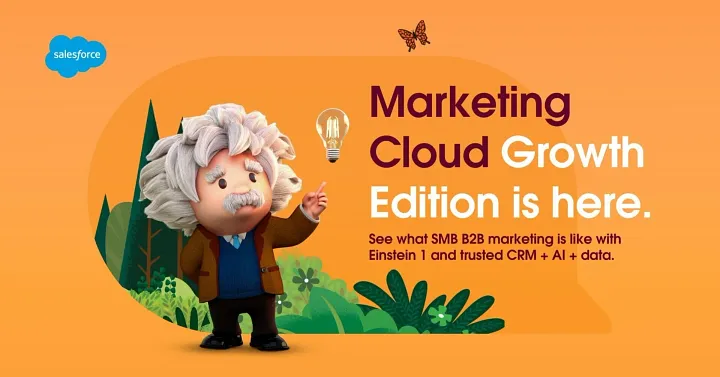
Who should consider Marketing Cloud Growth?
Salesforce positions Salesforce Marketing Cloud Growth as a B2B marketing automation product for small and medium companies. So, all SMBs entering the Salesforce ecosystem should consider implementing Marketing Cloud Growth rather than Marketing Cloud Account Engagement. Everything, of course, will depend on the functionality that a particular company needs.
⚠ Note: As of 18.04.2024, Marketing Cloud Growth is available only in the American region.
⚠ Well, there is also a catch. You can buy Marketing Cloud Growth Edition only if you have Enterprise or Unlimited Edition of Sales Cloud or Service Cloud. But what SMB will be able to spend 165$ or more per user per month on these licenses?
We must remember that Marketing Cloud Growth is a freshly released product that will be quickly updated. Salesforce devs will focus on developing this tool, bringing new functionalities, and fixing issues. This license restriction may only be temporary, just to reduce the number of potential clients to handle.
Marketing Cloud Growth Functionalities
Marketing Cloud Growth combines the Data Cloud and Marketing Cloud functionalities into one. Data Cloud allows you to ingest, process, harmonize and unify data, and then create segments from this data. Marketing Cloud uses segments as a data source for e-mail and SMS campaigns. That’s quite simplification, so let’s get deeper.
Data Cloud

Marketing Cloud Growth is built on Salesforce Data Cloud, which provides data ingestion, storage, data processing, segmentation features, and more. Let’s go through the most important capabilities.
Data Ingestion option allows us to ingest the data from multiple sources (other Salesforce products, Cloud providers, Snowflake, SFTP, and API connectors) to the Data Lake objects stored inside Data Cloud. You can ingest data in batches, stream the data, or use zero-ETL connections (currently for Google BigQuery and Snowflake).
Data Processing provides tools for data cleansing and preparation. During the ingestion you can create new formula field records with the option to merge or convert records. The other tool is Data Transform, which allows you to filter, modify, add, or delete records.
Data Harmonization allows you to map your data from Data Lakes to Data Models, and implement proper relationships to connect all the data into one ecosystem. This step is necessary for data unification and further segmentation use.
Data Unification provides an option to merge customer data from many sources and merge it into a single customer view, using a tool called Identity Resolution. You can prioritize the data sources and create your identity resolution requirements.
Insights is a name for all stuff connected with analyzing data. You can create Calculated Insights and filters to gather more information about customers using all data with a drag-and-drop UI or using SOQL language. They can be used in the analytics process or the segment creation.
All the functionalities are similar to what we can get by buying a separate Data Cloud license or using the free tier Data Cloud Provisioning package, but with a no-cost variant, we are not able to segment and activate the data.
Segments
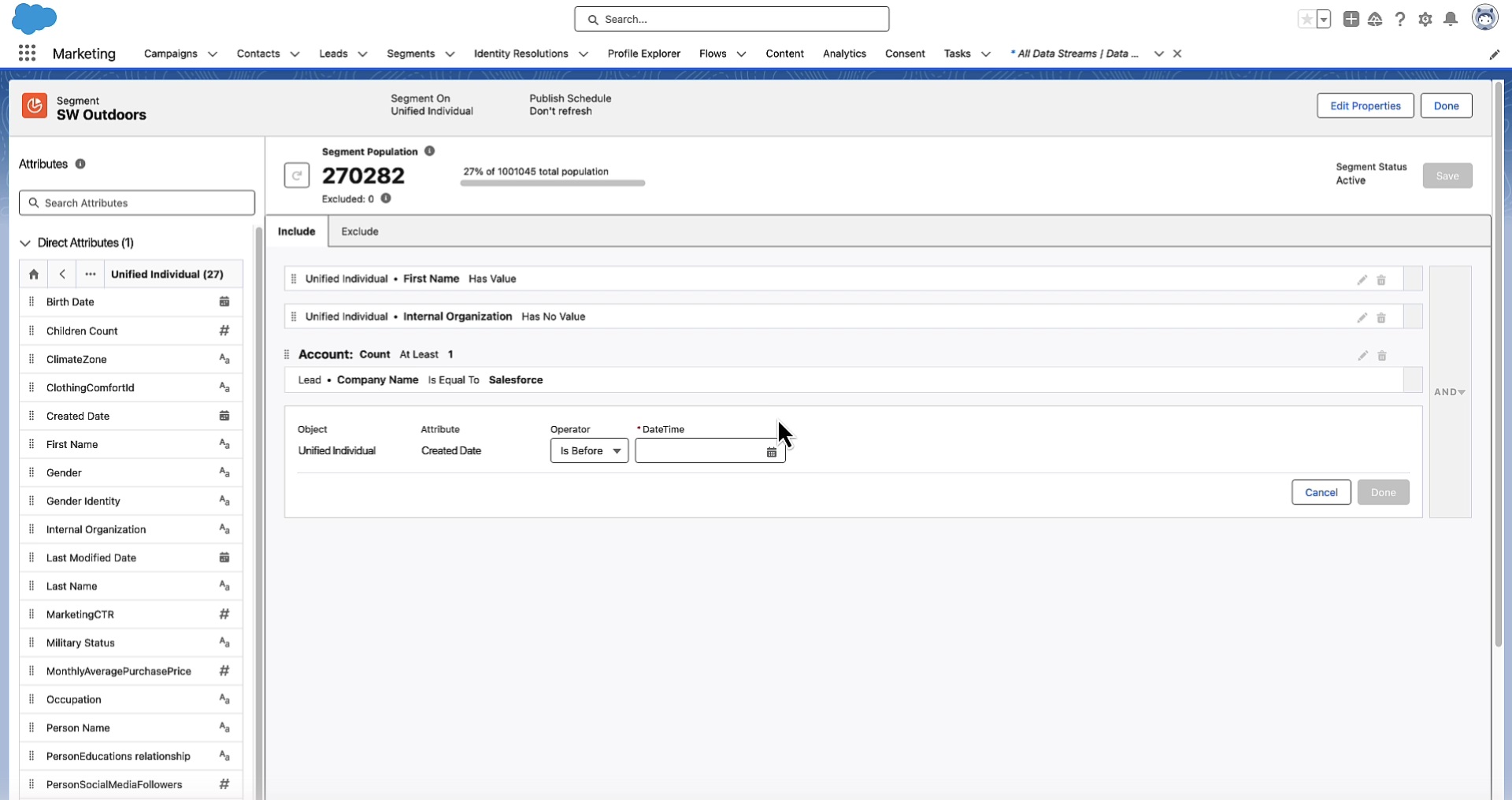
Segmentation in Marketing Cloud Growth is the final functionality that connects the Data Cloud with the Marketing side of functionalities. Segments provide the option to split your audience into groups that share some common context, e.g. people that have loyalty status and purchased something in the last 30 days.
✔ Segments in MC Growth utilize the Data Cloud’s drag-and-drop UI (or Einstein Generative AI) for creating the segment, which is a huge advantage compared to Engagement, which lacks the UI-friendly segmentation option without any third-party tools.
And here it comes to the second probable advantage of Marketing Cloud Growth. When it comes to sending the data from Data Cloud to the classic Marketing Cloud Engagement, you will have to wait 1 hour (for rapid segments) or 24 hours for a segment activation in the Engagement. But in Growth Edition you will base on the segments directly from Data Cloud, so your data will be populated quicker. The segment activation comes to choosing the segment as the entry source of the Flow.
CMS
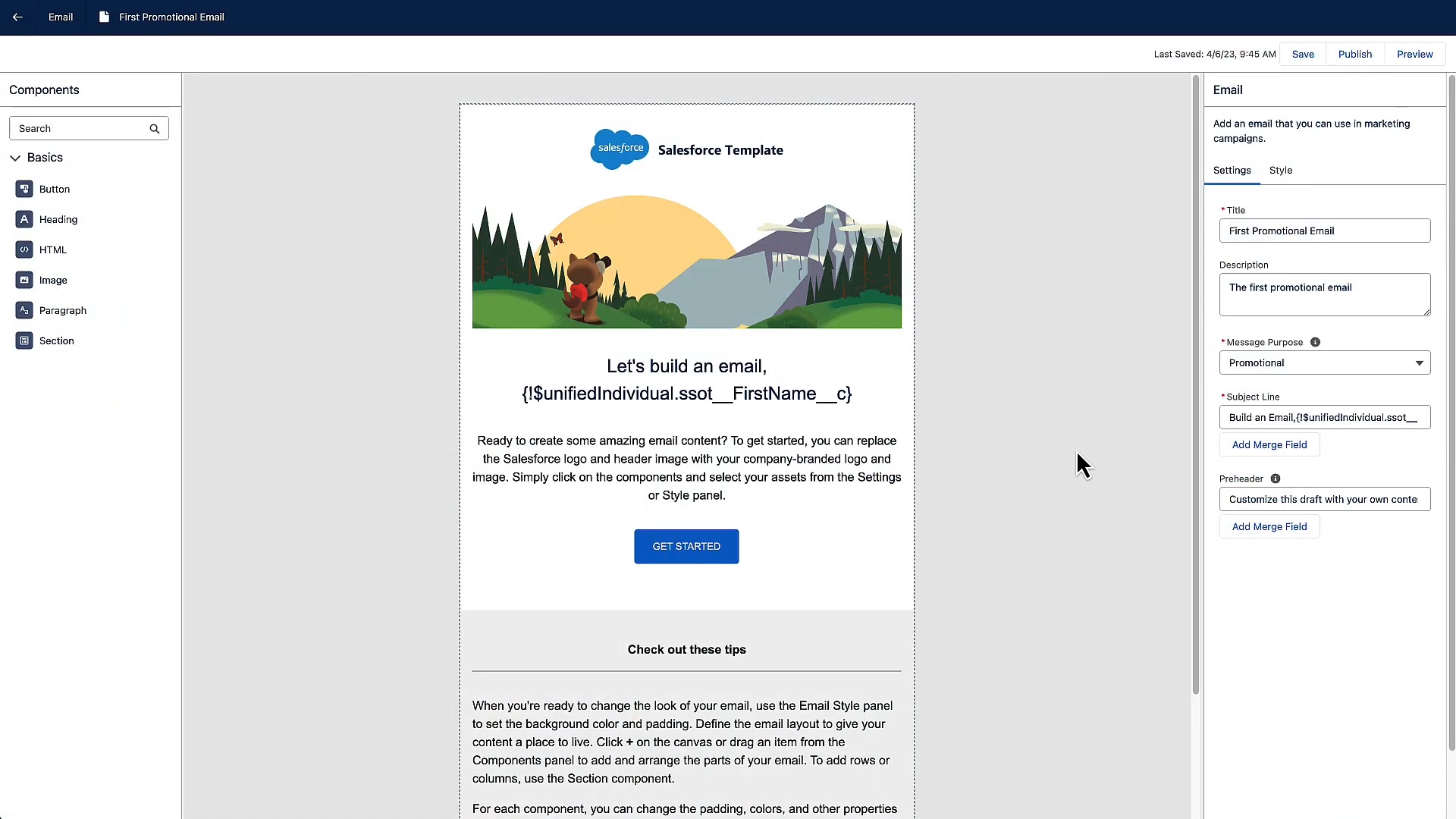
One of the functionalities brought straight from the Marketing Cloud Engagement is the Content Builder moved into one section called CMS or Content. There you can store images, emails, forms, landing pages, and SMS messages.
Here you can also create Emails, Forms, and Landing Pages, using a drop-down menu or (probably) HTML, CSS, and personalization handlebars.
Campaigns
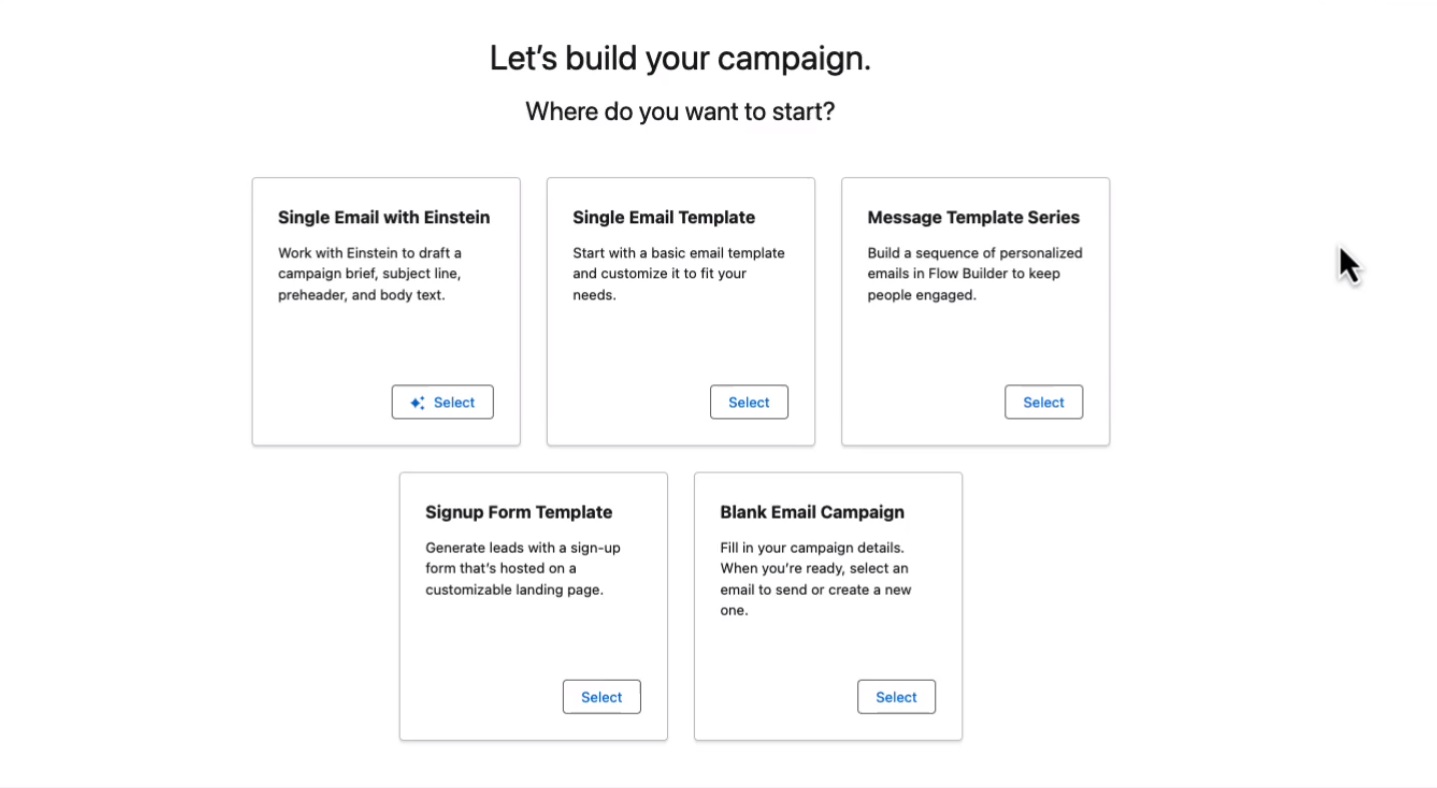
The Campaign section aggregates all the content and flows into one place. You can create parent and child campaigns and plan them for a specific period. You can also estimate stats, such as expected budget, revenue, response, etc. The campaign will aggregate the content used in it into one place.
You can prepare a single email and single form directly in the Campaigns menu, but if you want to create a more complicated journey, you must add the Flow.
Flows
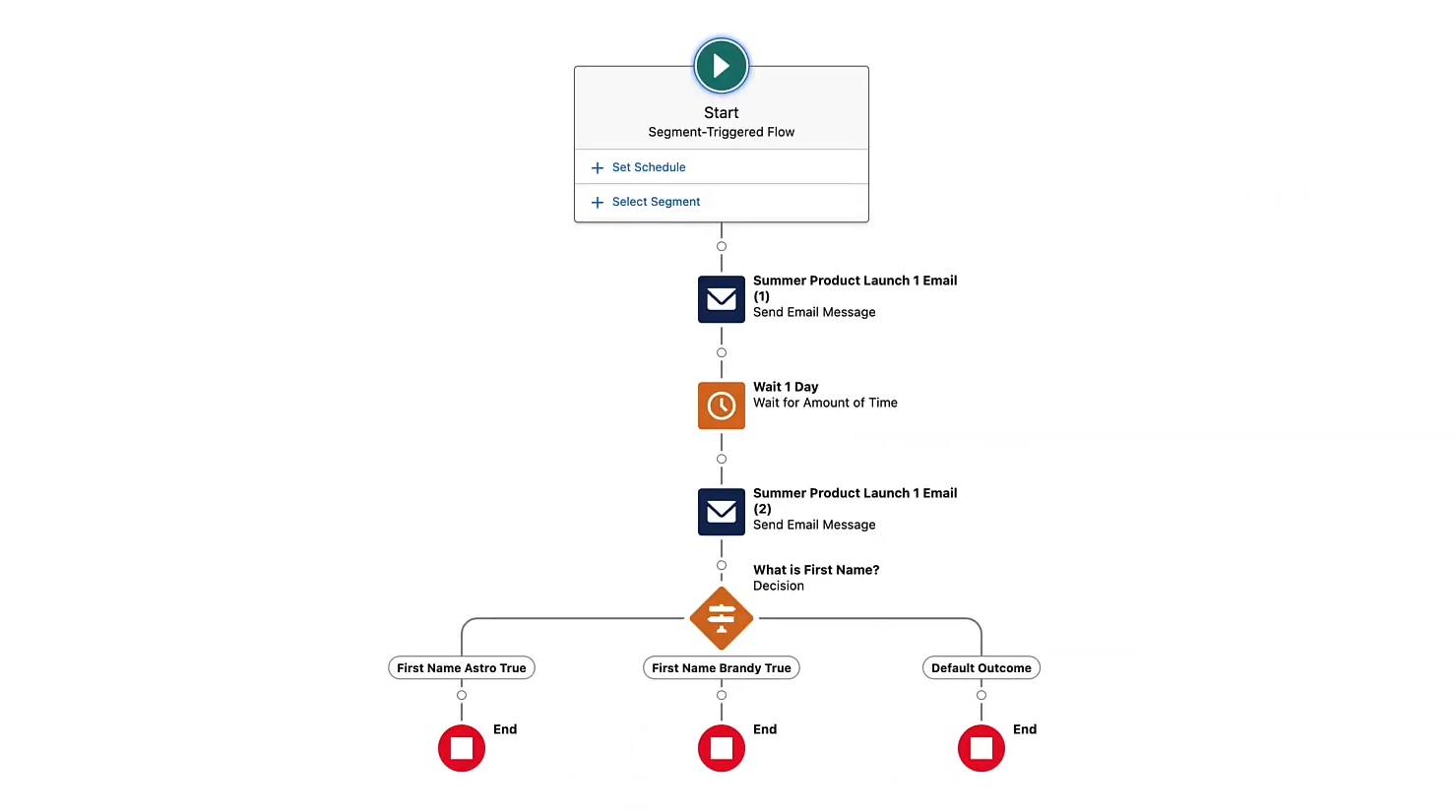
Flows in Marketing Cloud Growth are just Salesforce Flows tailored to the Marketing needs. You will find here elements allowing you to create Decisions (IF/ELSE statements), add, update, or delete records in Salesforce, send email/SMS messages, and wait for some condition.
You can trigger flows within a segment or a form, but when you use a form as a trigger, you will be able to add only wait, decision, and create record elements.
Einstein AI
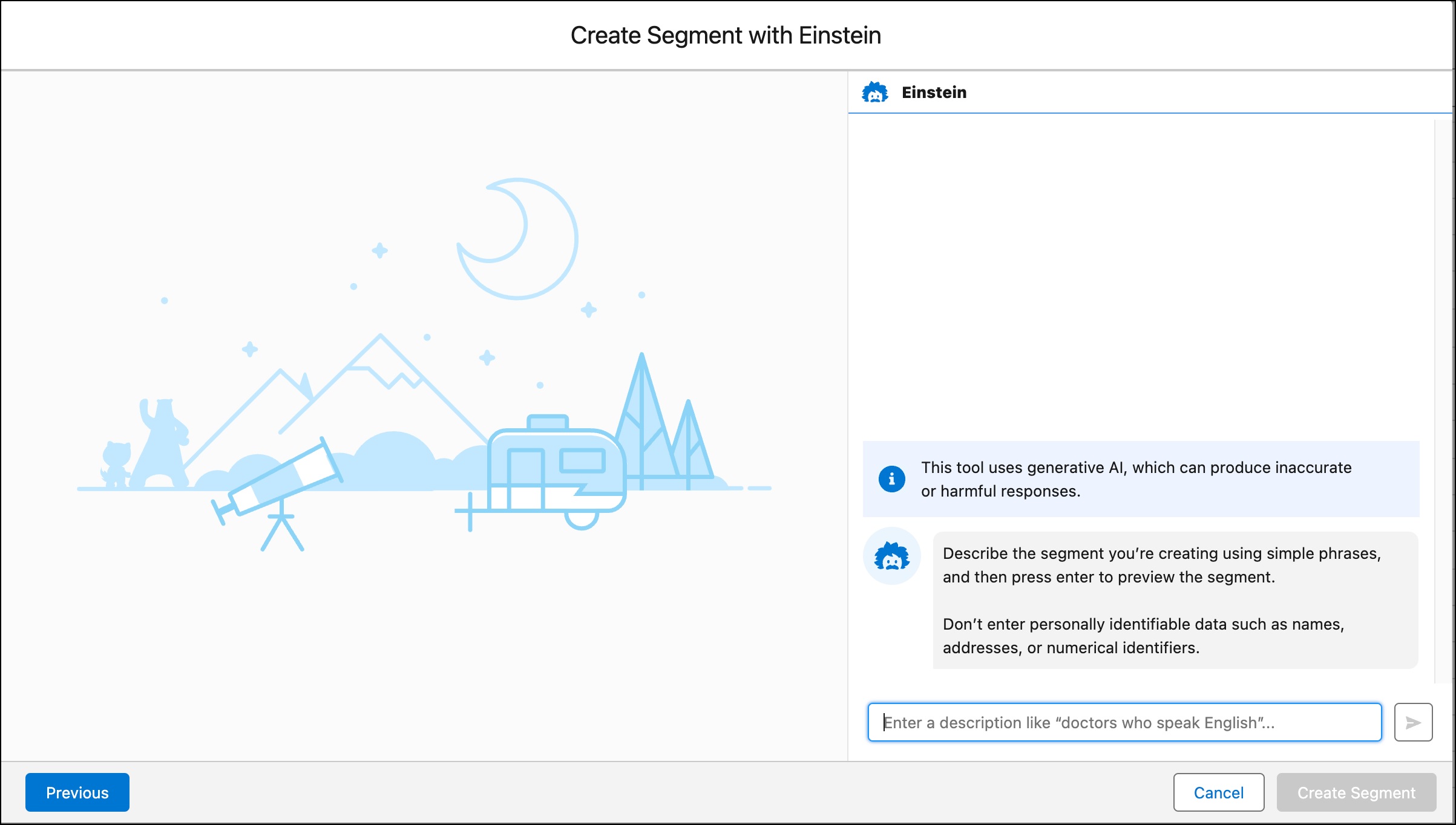
Watching the marketing materials about Growth Edition you can easily say that it is all about AI, especially generative AI. Marketing Cloud Growth provides access to many Einstein AI tools that are available in every corner of this product.
Einstein Lookalike Segments helps you with creating a segment audience that is similar to an existing one. A good way to create a seed segment with some basic parameters and break it with AI into smaller segments with additional characteristics.
Einstein Segment Creation allows you to use generative AI in the segment creation process. With a proper prompt, Einstein will create a ready segment with the parameters that you want. A good way to speed up your work without spending time in the drag-and-drop UI.
Einstein Co-Create uses a generative AI to help you write the email subject lines, preheaders, and body. It can generate your email content based on the prompt that you will enter. A good way to speed up your work or to find ideas for subject lines.
Einstein Metrics Guard gives you a confidence score from 0% to 100% if the email open or email click was performed by a human or machine. A good way to analyze the quality of your customer base.
Einstein Send Time Optimization uses predictive AI to find the perfect day and time to send the email to the individual recipient. A good way to boost the open rate probability.
Bring Your Own Model is one of the functionalities of Data Cloud that allows you to use external AI models in the Salesforce ecosystem. A good way to use if your company uses its own hosted model or model that is connected with third-party tools.
Consent Manager
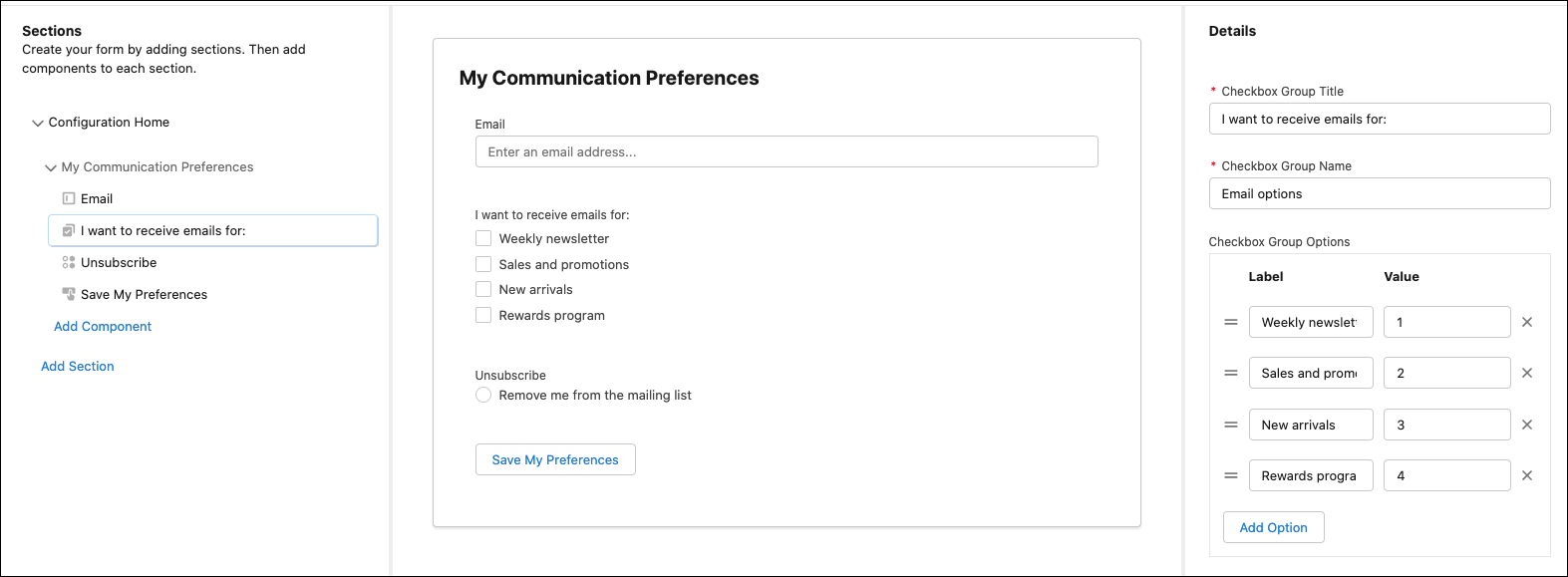
Marketing Cloud Growth Edition allows you to easily create and manage Consent for the marketing activities, split by channel (email or SMS) and by topic. In growth, consents are called Communication Subscriptions.
MC Growth comes also with a basic Preference Manager form that allows users to change their preferences. They can unsubscribe from the mailing lists or decide what email/SMS m message types (Communication Subscriptions) they want to receive. You can create forms with a UI-friendly editor or cover more complex scenarios with forms created with Apex code.
Reporting
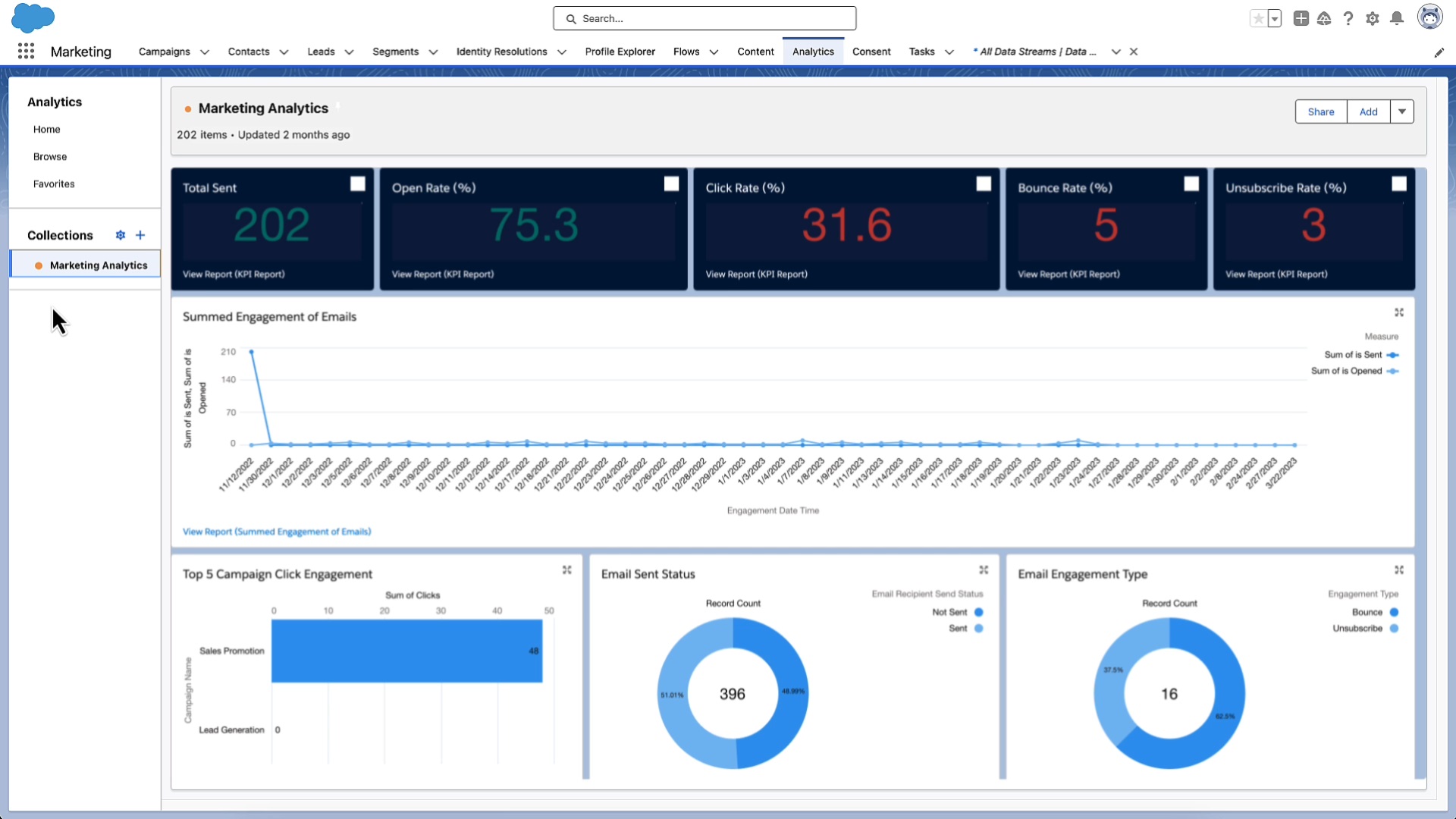
Marketing Cloud Growth uses the Data Cloud reports in the Analytics tab to measure the effect of each campaign. You can use several reporting types and create a personalized dashboard that will include all the information that you need.
MC Growth uses the dashboard Metric Formulas, which are simple functions counting for example Open Rate or Click-Through Rate. You could enrich your dashboard with these formulas.
API Functionalities
Marketing Cloud Growth offers API functionalities that could speed up your work if you are a more advanced user. It provides API calls to:
- Manage Records – getting, creating, updating, querying, and deleting records in the MC Growth
- Manage Identity Resolution – listing the rulesets, getting ruleset details, and running rulesets
- Manage Segments – listing the segments, getting segment details and members, publishing segments
- Manage Content – uploading and publishing content
- Manage Flows – listing the flows
Marketing Cloud Growth Pricing
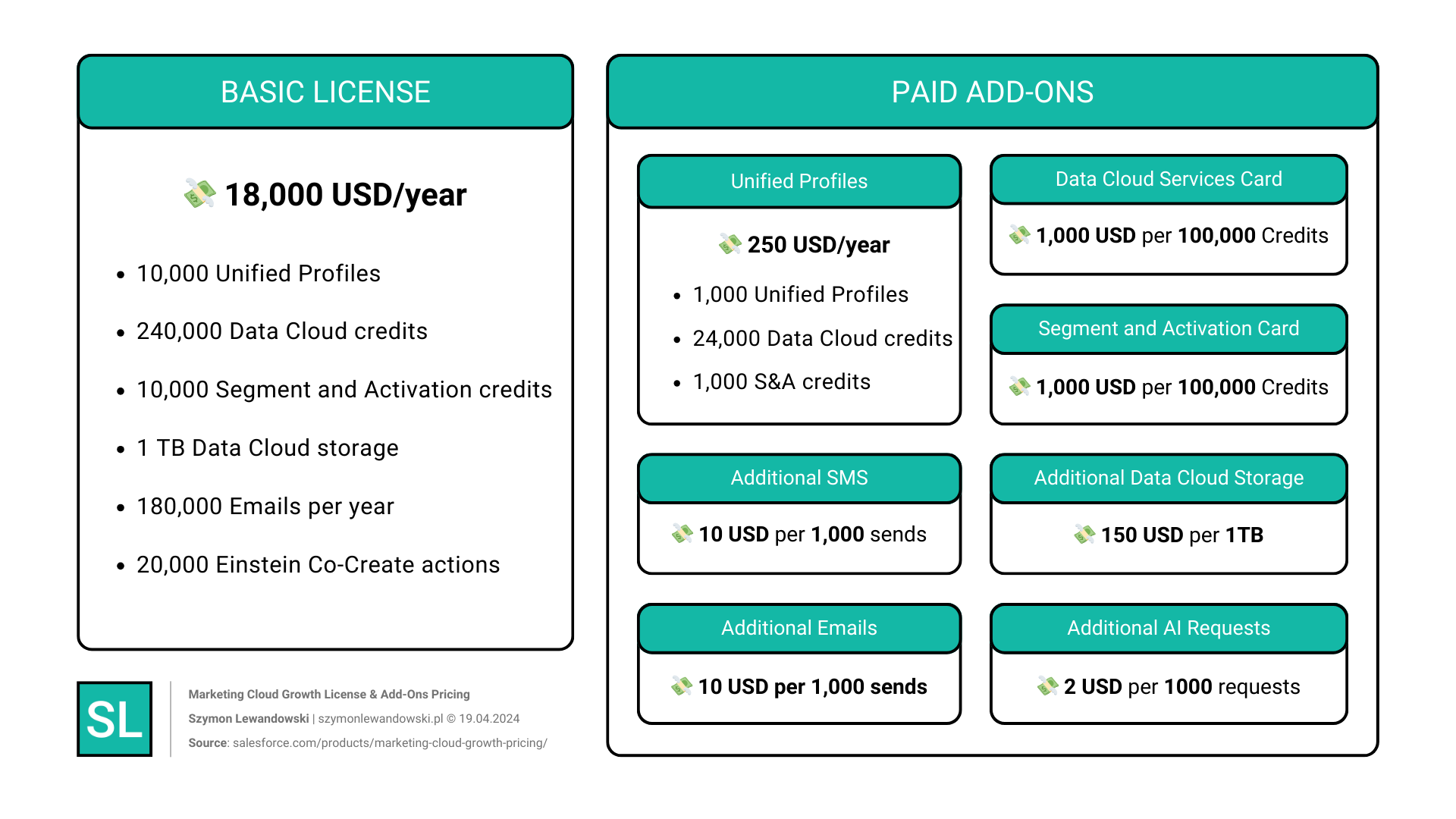
Marketing Cloud Growth comes with the 18,000 USD/year basic license price. It includes:
10,000 Marketing Unified Profiles – this could be painful, in practice. It allows us to send emails only to 10k people if we have data about our customers from multiple sources. The extension is also pretty expensive with a 250$/year package including 1k more Unified Profiles with some credits.
240,000 Data Cloud credits – 10k less than in a free tier license, and you can see that this 10k was moved to the segment and activation pool. It will be also very painful if we want to scale our solution because an additional 100k credits cost 1,000 USD. Check the Salesforce Data Cloud Credits Guide for more information about credits and calculations.
10,000 Segment and Activation credits – 10k credits should be enough for small segments of people if we stick with 10k Unified Profiles. The add-on is also pretty expensive.
1 TB of Data Cloud storage – a lot of space for our data, so it shouldn’t be a problem. You can add another 1 TB of space for 150$.
180,000 Emails per year – 15k per month, easily scalable with 10$ price tag per 1,000 emails.
20,000 AI Requests for Einstein Co-Create – not confirmed due to differences between documentation (10k requests) and pricing sources (20k). But it shouldn’t be a problem 2$ add-on with 1,000 requests.
⚠ There are also some other platform limits, especially when it comes to Flows, CMS, and Segments. Check especially the CMS Storage limit if you would like to create more visual content with high-quality images.
| Resource | Limit |
|---|---|
Active Flows | 500 |
Total Flows | 50,000 |
Versions per flow | 50 |
Email sends per month | 15,000 |
CMS Storage | 10 GB + 2 GB per user |
Active Segments | 9,950 |
Filters | 100 |
Einstein Lookalike seed Segment | 30 |
Einstein Segments created per month | 300 per license or 400 per org |
Marketing Cloud Growth Useful Links
Useful links to the official materials from Salesforce:
- MC Growth Documentation
- MC Growth Developer Documentation
- MC Growth Implementation Guide
- MC Growth Setup Checklist
- MC Growth Welcome Video
- MC Growth Quick Tips Videos
- MC Growth Email Marketing Trailhead Module
- MC Growth Pricing Page
Useful links to other materials:
For now, the Marketing Cloud Growth knowledge base is kinda of limited. But there should be more materials in the future. I will be updating this list, so save this article for later. I usually write about article updates on my LinkedIn, feel free to follow me there. 😉
Read also: How to send user data from Personalization to Marketing Cloud
